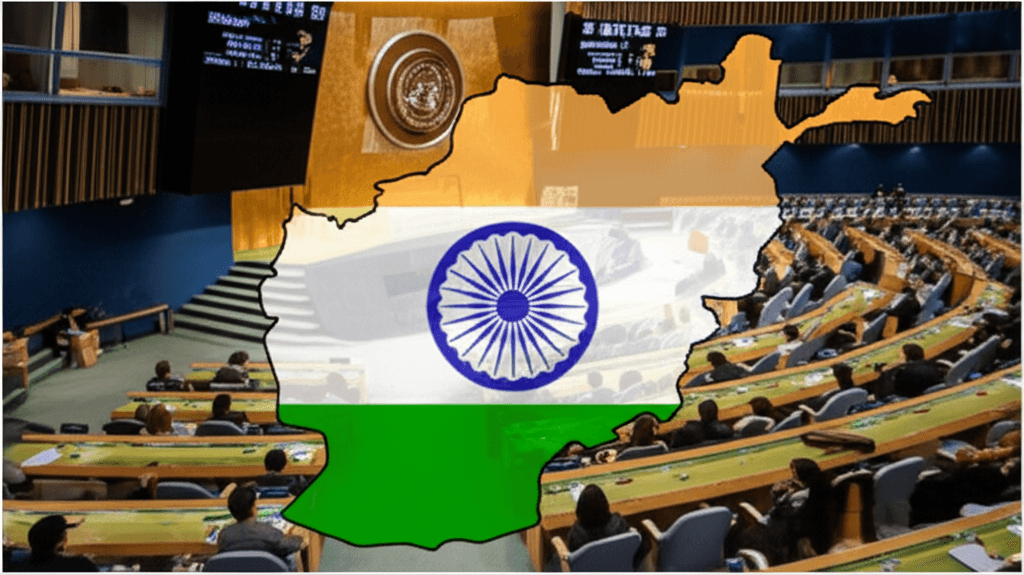India’s UNGA Vote: A Pragmatic Pivot Towards the Taliban Reality
India's recent vote at the UN General Assembly regarding Afghanistan signals a nuanced shift in its foreign policy, moving towards a pragmatic engagement with the Taliban-led reality on the ground. This isn't an endorsement but a calculated recognition of geopolitical imperatives.

A Calculated Shift at the UNGA
In the complex theater of international diplomacy, every vote counts, and sometimes, an abstention or a nuanced stance can speak volumes. India's recent approach to resolutions concerning Afghanistan at the United Nations General Assembly (UNGA) has drawn significant attention, particularly its subtle, yet discernible, shift towards what many are calling a 'pragmatic embrace' of the Taliban reality. This isn't about legitimizing the Taliban regime, which remains unrecognized by most of the world, but about acknowledging a de facto situation on the ground and calibrating foreign policy accordingly.
For decades, India has maintained a strong, democratic relationship with successive Afghan governments, investing billions in infrastructure, education, and development. The sudden collapse of the Ashraf Ghani government and the rapid takeover by the Taliban in August 2021 presented New Delhi with a significant foreign policy conundrum. How does a nation with deep historical ties and substantial security concerns navigate a landscape dominated by a group it has historically viewed with suspicion, particularly given its past links to terrorism and its close proximity to Pakistan?
The latest UNGA vote, which may have focused on humanitarian aid, political stability, or even the continuation of certain UN mandates within Afghanistan without directly endorsing the Taliban, underscores India's evolving strategy. It signals a move away from absolute non-engagement to a more practical, albeit cautious, interaction. It reflects a growing consensus that ignoring the Taliban isn't a viable long-term strategy for regional stability or for protecting India's multifaceted interests in Afghanistan.
From Distrust to De Facto Engagement: A Historical Perspective
India's relationship with Afghanistan has always been shaped by geopolitical currents. During the Taliban's first stint in power in the late 1990s, India was unequivocally against the regime, seeing it as a proxy for Pakistan's strategic depth and a breeding ground for extremist groups. The hijacking of Indian Airlines flight IC 814 in 1999, which culminated in the release of terrorists from Indian custody in exchange for hostages in Kandahar, remains a stark reminder of the animosity. Post-9/11 and the ousting of the Taliban, India became one of Afghanistan's largest regional aid donors, fostering strong ties with the democratically elected governments.
This historical backdrop makes the current shift all the more remarkable. When the Taliban returned to power in 2021, India initially adopted a wait-and-watch policy, evacuating its diplomatic staff and halting most official engagements. However, the ground reality quickly forced a re-evaluation. The Taliban, despite its repressive policies, demonstrated a consolidated control over the country. Ignoring them meant ceding influence entirely and potentially exacerbating India's security concerns.
Over the past couple of years, New Delhi has initiated low-key contacts, primarily through humanitarian aid channels. India has dispatched several consignments of wheat, medicines, and other essentials to Afghanistan, often through the Taliban administration. This engagement, while not formal recognition, has allowed for channels of communication to remain open – a critical step for any state grappling with a complex regional security environment.
The Anatomy of Pragmatism: Why the Shift Now?
The term 'pragmatic embrace' isn't about ideological alignment but a strategic necessity. India's UNGA vote is a tacit acknowledgment that the Taliban is the undisputed power in Afghanistan, and any effective strategy must contend with this fact. Several factors underpin this pragmatic pivot:
1. Counter-Terrorism and Security Imperatives
For India, the primary concern emanating from Afghanistan is the potential for the country to become a safe haven for cross-border terrorism. Groups like Lashkar-e-Taiba (LeT) and Jaish-e-Mohammed (JeM), which have historically targeted India, could find sanctuary there. While the Taliban has repeatedly stated it will not allow Afghan soil to be used against other countries, their track record and ideological sympathies remain a major concern. Direct or indirect engagement, even at a basic level, provides a channel to convey these security concerns and, perhaps, gain intelligence or exert limited pressure. Without any contact, India would be blind to developments that directly impact its national security.
2. Regional Stability and Geopolitical Dynamics
A stable Afghanistan, even under Taliban rule, is preferable to a chaotic one. Instability in Afghanistan has ripple effects across Central Asia and South Asia, leading to refugee crises, increased drug trafficking, and the proliferation of extremist ideologies. India, as a major regional power, has a vested interest in fostering stability, even if it means dealing with an unpalatable regime. Furthermore, India is keenly aware of the influence wielded by other regional players, notably China, Pakistan, Russia, and Iran, who have all adopted varying degrees of engagement with the Taliban. India cannot afford to be completely isolated from the developments there, especially as other major powers like China step up their economic and strategic presence.
3. Humanitarian Concerns and Soft Power
Despite its reservations about the Taliban, India has consistently provided humanitarian assistance to the Afghan people, who are facing severe economic and social crises. This aid is a continuation of India's long-standing commitment to Afghanistan's development and well-being. By engaging on humanitarian grounds, India not only upholds its moral obligations but also reinforces its 'soft power' influence, demonstrating that its commitment extends beyond political regimes. This approach distinguishes India's engagement from pure political recognition and maintains a critical lifeline to the Afghan population.
4. Protecting Past Investments and Future Prospects
India has invested over $3 billion in Afghanistan, constructing vital infrastructure projects like the Afghan Parliament, the Salma Dam (India-Afghanistan Friendship Dam), and roads. While the immediate future of these projects under Taliban rule is uncertain, maintaining some level of engagement offers the remote possibility of protecting these assets or at least having a say in their future. Moreover, Afghanistan, with its vast mineral resources and strategic location, remains a potential economic partner in the long run. India's digital initiatives, for instance, could find avenues in the country once stability improves. You can learn more about India's digital leap and innovation hubs, which are transforming the nation and its global outlook.
The UNGA Vote: A Statement of Intent
The specific UNGA vote at the heart of this discussion likely pertains to a resolution that either avoids direct condemnation of the Taliban's administrative control or focuses on mechanisms for continued engagement, such as humanitarian assistance or the maintenance of UN presence. By voting in a manner that supports or abstains from resolutions that could otherwise isolate the Taliban further, India sends a clear message:
"While our principles against the Taliban's governance model remain firm, the reality demands a practical approach. We recognize the need for channels to address our core interests – security, humanitarian aid, and regional stability – without necessarily legitimizing the regime itself."
This is a delicate balancing act. It allows India to participate in multilateral efforts concerning Afghanistan, ensuring its voice is heard, rather than being relegated to the sidelines. It also allows India to differentiate its strategy from Western nations that have largely maintained a policy of isolation.
Navigating the Minefield: Challenges and Criticisms
This pragmatic shift isn't without its challenges or critics. The Taliban's egregious human rights record, particularly their systematic oppression of women and girls, poses a significant moral dilemma for a democratic nation like India. Critics argue that any engagement, no matter how 'pragmatic,' risks implicitly condoning these actions. India faces the delicate task of balancing its strategic interests with its democratic values and international obligations.
Furthermore, the reliability of the Taliban as a negotiating partner remains questionable. Their internal factions, their commitment to international promises, and their ability to control various extremist elements within Afghanistan are all significant variables that India must constantly assess. The risk of blowback, where engagement is misconstrued as endorsement, is always present.
Looking Ahead: What Does This Mean for India-Afghanistan Relations?
India's UNGA vote is unlikely to be a prelude to full diplomatic recognition of the Taliban. That step would be a monumental shift requiring far greater concessions from the Taliban regarding human rights, counter-terrorism, and inclusive governance – conditions they have shown little inclination to meet. Instead, this pragmatic approach suggests a continuation of a 'functional' relationship. India will likely maintain low-level diplomatic contact, continue its humanitarian efforts, and engage in multilateral forums concerning Afghanistan.
This strategy allows India to:
- Maintain a presence and influence in Afghanistan without granting legitimacy.
- Address direct security threats stemming from the region.
- Contribute to regional stability, aligning with its broader foreign policy goals.
- Protect its long-term strategic interests in a geographically crucial neighbor.
The world is rapidly evolving, and foreign policy, especially concerning complex geopolitical hotspots, requires flexibility and a keen eye on realpolitik. India's UNGA vote on Afghanistan exemplifies this principle, marking a mature and calculated adaptation to an unavoidable reality. It's a move that prioritizes national interest and regional stability over ideological purity, navigating a very challenging diplomatic tightrope. For more insights into India's strategic foreign policy decisions, explore our Politics category on TrendPulseZone.
Comments
Loading comments...
Related Articles

Olivia Nuzzi's 'American Canto': A Deep Dive into Her Highly Anticipated New Book
Political journalist Olivia Nuzzi is set to captivate readers with her new book, 'American Canto,' promising an unfiltered, deeply immersive journey into the heart of contemporary American politics. This article explores Nuzzi's distinctive voice, her career trajectory, and the profound themes readers can expect from her latest literary endeavor.